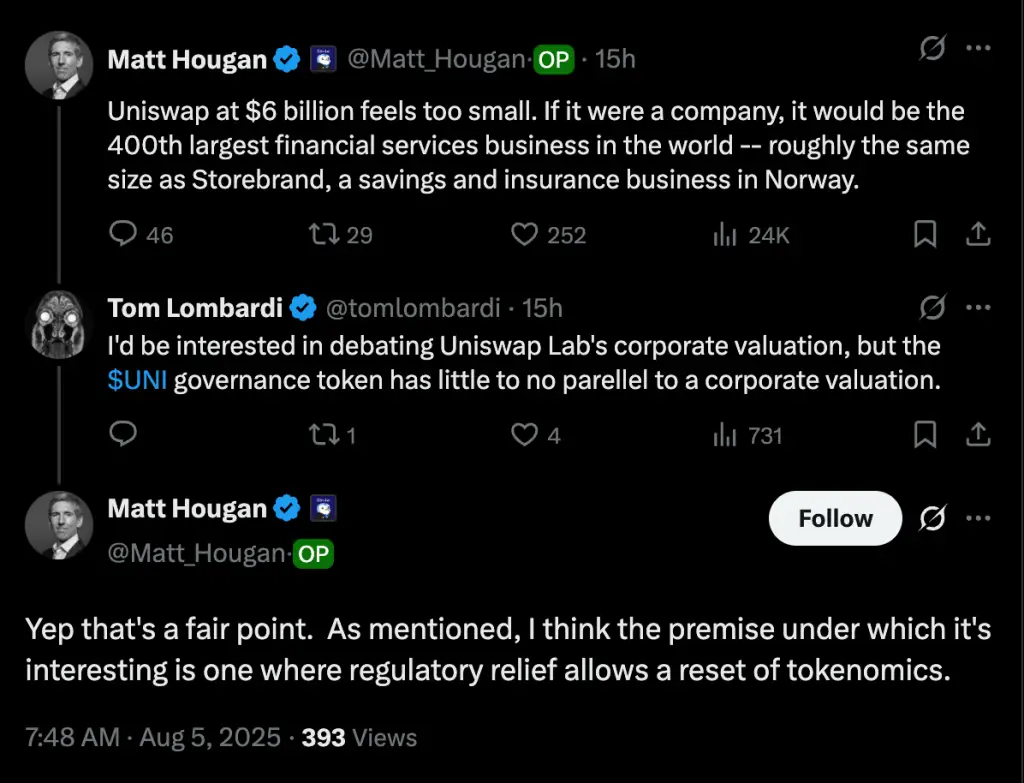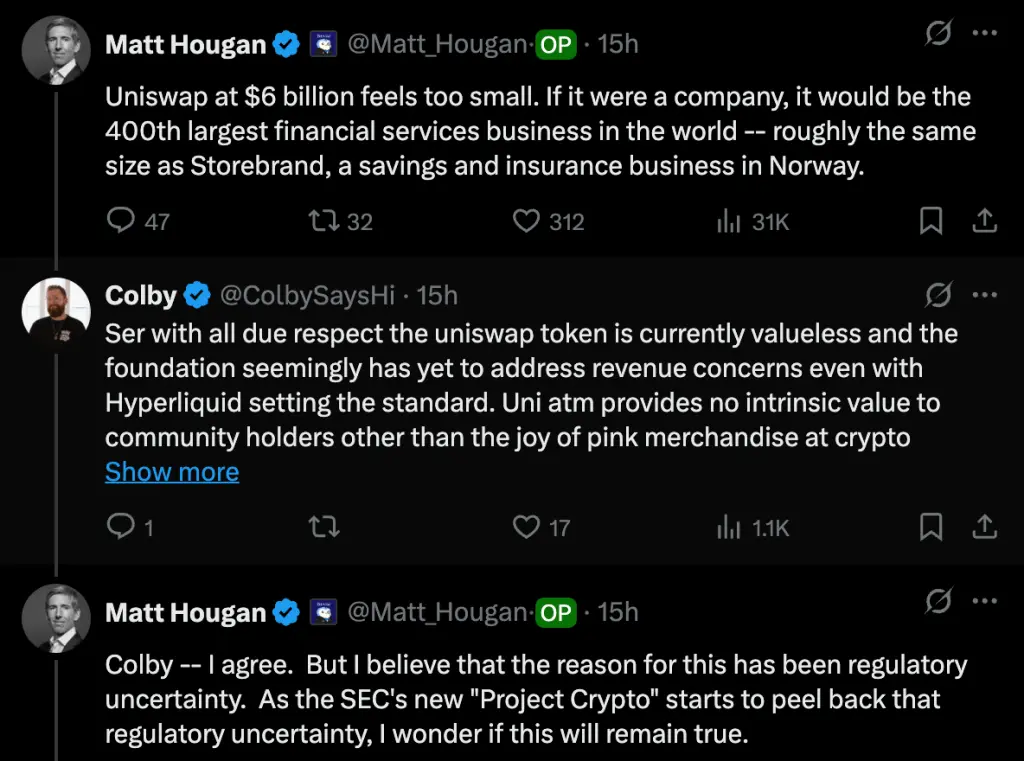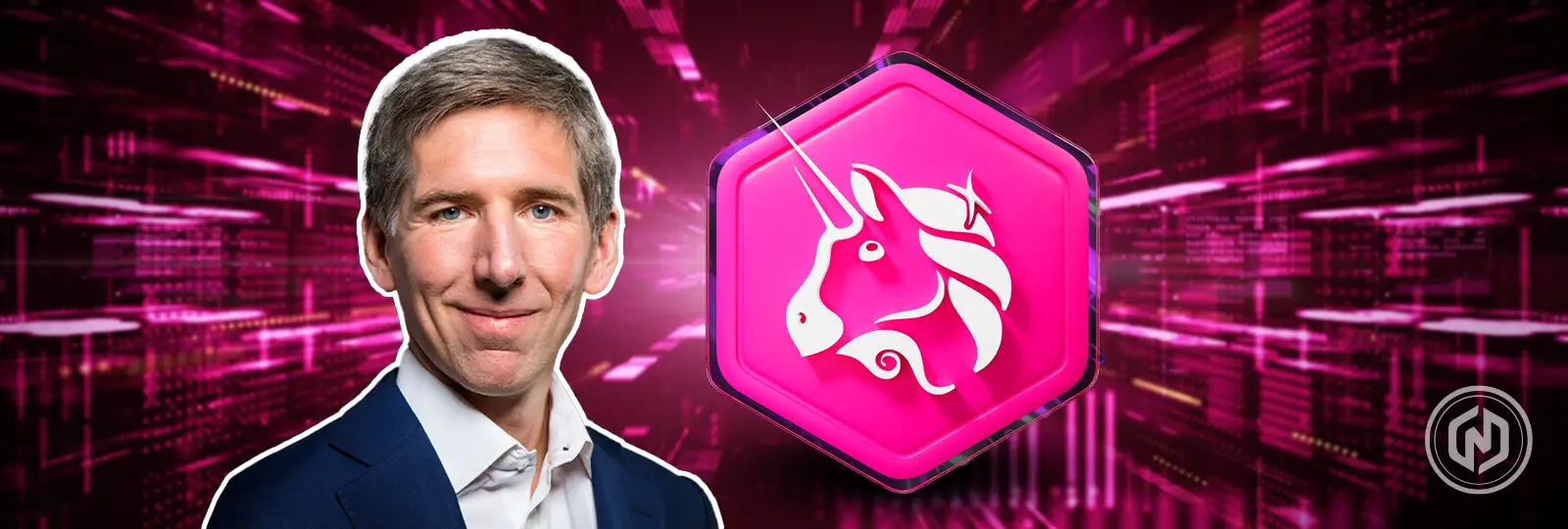- Bitwise CIO calls Uniswap’s $6B valuation too small for leading DEX protocol
- Token provides no cash flows to holders despite $1B+ annual fee generation
- SEC’s Project Crypto could enable tokenomics reset for revenue distribution
Given the protocol’s financial success and market position, Bitwise Chief Investment Officer Matt Hougan has maintained that Uniswap’s $6 billion market valuation seems undervalued.
According to Hougan, Uniswap would be the 400th largest financial services company in the world if it were a regular business. Additionally, he contrasted it with Storebrand, a savings and insurance company based in Norway.
The assessment comes as UNI token trades with a $5.88 billion market cap despite generating over $1 billion in annual fees through the decentralized exchange protocol.
Hougan’s valuation concerns highlight the disconnect between protocol success and token holder value in current decentralized finance structures.
Token Structure Lacks Traditional Value Mechanisms
Crypto analyst Tom Lombardi challenged the corporate comparison and noted that UNI governance tokens have little parallel to traditional corporate valuations.

The token currently provides holders with voting rights on protocol changes, but lacks direct cash flow distribution mechanisms that characterize equity investment.
Lombardi acknowledged Uniswap’s fee generation creates underlying value but questioned how to assess tokens without cash flows or potential acquisition exits.
The uncertainty extends to decentralized autonomous organizations, which remain untested in delivering direct value to token holders through established mechanisms.
Community member Colby criticized the current token structure more directly. He called UNI as “currently valueless” to holders beyond governance participation and branded merchandise at crypto events.
Regulatory Clarity Could Enable Tokenomics Reform
Hougan attributed Uniswap’s conservative token structure to regulatory uncertainty that has prevented revenue-sharing implementations.
The CIO suggested that the SEC’s new “Project Crypto” initiative could reduce regulatory barriers that have limited token utility and value distribution.

The regulatory environment has historically discouraged protocols from implementing direct revenue sharing with token holders due to potential securities law violations. Many projects have adopted governance-only tokens to avoid regulatory scrutiny while maintaining decentralized operations.
Colby expressed hope that regulatory clarity would allow revenue mechanisms across major cryptocurrency projects and described it as crucial for industry maturation.
The community member noted that simply changing SEC leadership wasn’t sufficient to enable revenue proposals without comprehensive regulatory frameworks.
Uniswap Protocol Performance Exceeds Token Valuation
Uniswap’s protocol metrics support arguments for higher valuations, with the platform processing billions in trading volume while maintaining its position as the leading decentralized exchange.
The protocol’s consistent fee generation and market dominance create fundamental value that current token pricing may not fully capture.
Uniswap price has gained over 100% in the past year and shows some market recognition of underlying protocol strength. However, the gains appear modest compared to protocol growth and fee generation improvements over the same period.
The disconnect between Uniswap protocol success and token performance affects multiple DeFi projects operating under similar regulatory constraints. Many leading protocols generate substantial fees while providing limited direct value to token holders beyond governance rights.
The discussion shows the overall industry challenges in aligning protocol success with token holder value under current regulatory frameworks. Project Crypto’s development could provide clarity that allows more traditional value distribution mechanisms.
Regulatory relief might allow protocols to implement dividend-like distributions, buyback programs, or other value-sharing mechanisms currently considered risky under securities laws. Such changes could fundamentally change how markets value governance tokens and decentralized protocols.


